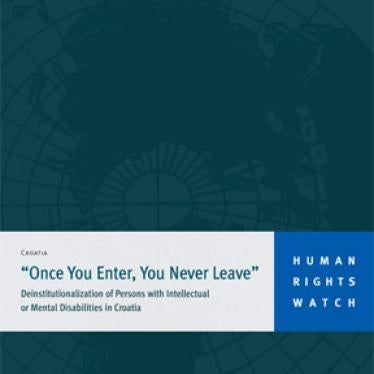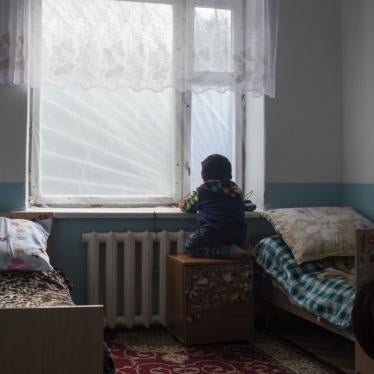Dear Prime Minister Kosor,
Human Rights Watch and the Mental Disability Advocacy Center (MDAC) are writing to express concerns about Croatia's rate of progress in implementing its commitments concerning the human rights of persons with disabilities. In particular, we are concerned about the delay in adopting a deinstitutionalization plan and providing people with psychosocial and intellectual disabilities with options for housing and support in the community.
Since becoming one of the first state parties to the UN Convention on the Rights of Persons with Disabilities (CRPD), Croatia has asserted a leadership role in promoting all rights of persons with disabilities, including the right to live in the community with support. Croatia also signed an agreement with the European Union in 2006, the Joint Memorandum on Social Inclusion, which includes a pledge to deinstitutionalize and requires a plan for deinstitutionalization. The EU adopted their Disability Strategy 2010-2020 in November 2010 and ratified the CRPD in December 2010, and as a candidate country, it is essential that Croatia lives up to EU human rights standards.
In the UN Human Rights Council session on November 8, 2010, Croatia recognized the urgency of its commitments by pledging to release a plan for deinstitutionalization by the end of the year. That followed assurances Human Rights Watch received in September that the plan would be released imminently. We are therefore disappointed to find that this master plan has not yet been released and are eager to hear the reasons for the delay.
As documented by Human Rights Watch in a report released in September 2010, and as MDAC has witnessed during four years of research in Croatia, there are still approximately 9,000 persons with intellectual or psychosocial disabilities living in Croatian institutions that strip them of autonomy, dignity, and the chance to lead full lives. The number of persons with intellectual or psychosocial disabilities living in institutions is growing instead of shrinking according to the Ministry of Health and Social Welfare's own statistics, and few are leaving or have ever left institutions to live in the community.
We recognize that deinstitutionalization is a process that may take some time to complete. But a plan for deinstitutionalization that incorporates the wishes and desires of persons with disabilities and contains clear actions to develop community-based services and housing options and to close institutions is an essential first step. One significant reason for the lack of progress on deinstitutionalization is the continued absence of governmental commitment or plan. Moreover, we respectfully remind the Government of its obligations under Article 4(3) of the CRPD to closely consult and actively involve persons with disabilities, including persons with intellectual or psychosocial disabilities, and their representative organizations in the development of any such plan.
It is now more than three years since Croatia ratified the CRPD and more than four years since it signed the Joint Inclusion Memorandum. It is imperative that Croatia immediately take the first step toward fulfilling its pledges by releasing a plan for deinstitutionalization, followed by prompt action on that plan.
Thank you for your time and consideration, and we look forward to a continuing dialogue on this issue.
Regards,
Benjamin Ward
Deputy Director, Europe and Central Asia Division
Human Rights Watch
Oliver Lewis
Executive Director
Mental Disability Advocacy Center
Cc:
Ivo Josipovic, President
Darko Milinovic, Minister of Health and Social Welfare
Tomislav Ivic, Minister of Family, Veterans' Affairs, and Intergenerational Solidarity
Paul Vandoren, European Union ambassador to Croatia
Štefan Füle, Commissioner for Enlargement and European Neighborhood Policy







